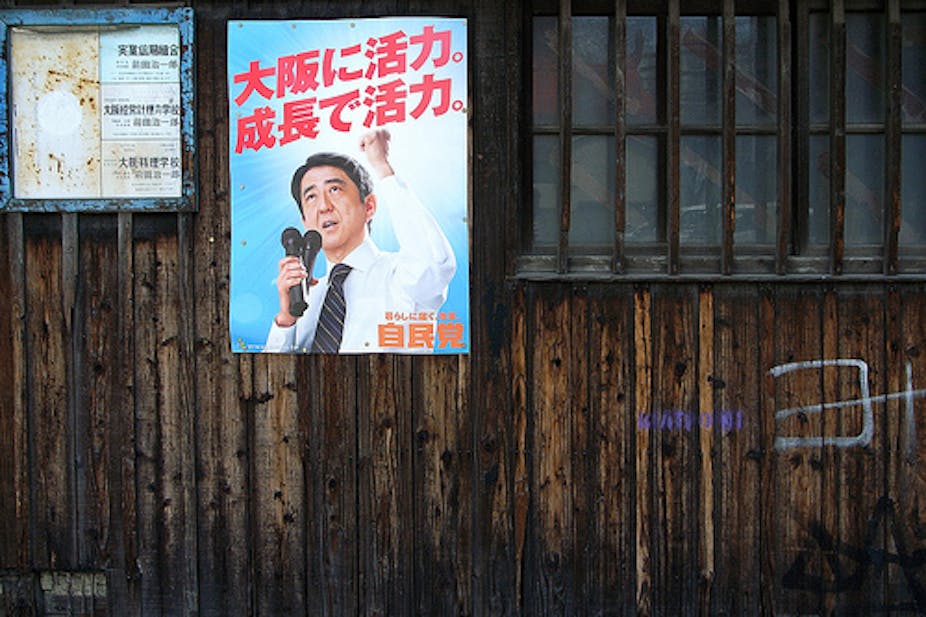I thought for a breathless moment back in 2009 that we would see a new progressive government in Japan. Gone would be almost six decades of unimaginative conservative rule. Gone would be the subservience of elected Diet members to an overweeningly arrogant bureaucracy. Gone would be the endemic complaisance of the Tokyo foreign policy establishment towards United States military “protection”.
Annual visits by the head of government to the Yasukuni Shrine that so upset the Koreans and Chinese would be things of the past. Relations with China would improve in other areas. New taxes would be brought in to cover a growing deficit in public finance. There might even be a new immigration policy that would allow young foreigners to settle in Japan to add much needed vigour to an ageing work force.
Those hopes were not realised. The three DPJ leaders who rotated so rapidly through the prime minister’s lodge in Nagata-cho between 2009 and 2012 proved to be indecisive and weak. Yukio Hatoyama succumbed to a financial scandal. Naoto Kan made a brave show of getting reforms going, but never really stood up to the bureaucracy, and came undone over his maladroit handling of the Fukushima nuclear disaster in 2011. Yoshihiko Noda was limp-wristed about many issues, including the need for economic reform and public outrage over the duplicity of TEPCO over Fukushima.
In December 2012, the inevitable dénouement occurred. The electorate did not so much vote in the LDP as vote out the DPJ. Winning 480 seats, the Liberal Democrat and New Komeito parties swept into office. The Japan Democrats lost 251 of their 308 seats, putting them barely ahead of the third force in the Diet, the ultra right-wing Japan Restoration Party. And this is a worry which I shall come back to.
The new Japanese prime minister, Shinzo Abe, is, to put it mildly, unimpressive. The grandson of one conservative post-war prime minister, Nobusuke Kishi, and grandnephew of another, Eisaku Sato, Abe has a formidable pedigree. But he showed no inherited leadership qualities when he hit the track in his first term as prime minister. Instead, he experienced a short, undistinguished year as Liberal Democratic prime minister before the Japan Democrats took over in 2009. In particular, his domestic economic policies were unimaginative, even timid.
Abe was even less impressive in handling non-economic issues. His conservatism shone through and he refused to entertain the possibility of a female heir to the Imperial throne. He supported Taiwan as a country independent of China. He repeatedly visited Yasukuni Shrine, resting place of many class-A war criminals. His pronouncements about Japan’s recent history encompassed the origins of the Pacific War (not Japan’s fault), distortions that continued to appear in Japanese history text books.
He claimed that Korean comfort women who serviced Japanese troops were mere prostitutes, increasing outrage in Seoul. When he visited Pyongyang, he negotiated with Kim Jong Il an agreement to bring some of the Japanese abducted years before by Pyongyang back to Japan for a visit, but then refused to return them to their families in Korea at the end of their stay. All these moves deeply offended the Koreans (both North and South), and on the text book issue, China.
As the recycled prime minister in 2012, Abe appears not to have modified these tendencies. Indeed, pressured as he will be by the ultra-nationalist Japan Restoration Party that has suddenly emerged as a third force in the Diet by scoring 54 seats – three less than the erstwhile governing Democratic Party of Japan - they are likely to be reinforced.

The JRP is led by the former Governor of Tokyo, Shintaro Ishihara, and his colleague from Osaka, Toru Hashimoto. Ishihara gained prominence by standing up to Washington in his book The Japan that can Say No. He wants bigger military forces and their re-appellation as Army, Navy and Air Force rather than “self-defence forces”. He wants to revise Article Nine of the Constitution to allow Japan the capacity to wage war.
The Fukushima disaster, he asserts, was divine punishment for Japanese indulgence. Japan should continue to pursue nuclear energy and acquire nuclear weapons. Ishihara’s stable-mate, Hashimoto, is mercurial, opinionated, and has more grass roots support outside his Osaka bailiwick that he is often given credit for. He shares many of Ishihara’s views, especially on foreign affairs, most dangerously on standing up to a resurgent China.
This all makes Abe’s dealing with China problematic. And, in response to such anti-China assertiveness by this new breed of Japanese reactionaries, Beijing has been ramping up its own territorial assertiveness over what it calls the Daioyu Islands.
In recent weeks it has sent a surveillance aircraft over the islands, with Japan Air Self Defence Force F15 fighter aircraft unsuccessfully scrambling to intercept it. Chinese naval vessels have patrolled through the area. On 13 December, a Chinese para-military aircraft overflew the islands’ airspace, and on 16 December, Chinese fisheries agency vessels appeared on patrol.
This is very dangerous. Even if officials from Beijing and Tokyo are hard at work trying to defuse the situation, a miscalculation by either side could easily lead to a shooting match.
Perhaps Abe or the new Chinese leadership will have the wisdom to back off. But it seems to me that at present the Japanese government is in crisis so deep that it is no longer morally or intellectually capable of being able to successfully deal with such issues. Or any others. I profoundly hope that I am wrong.

